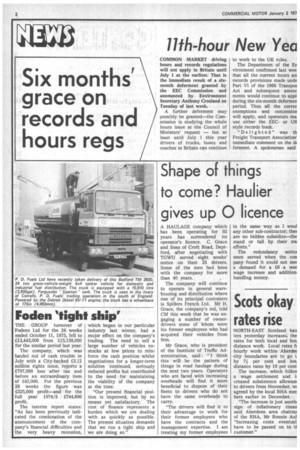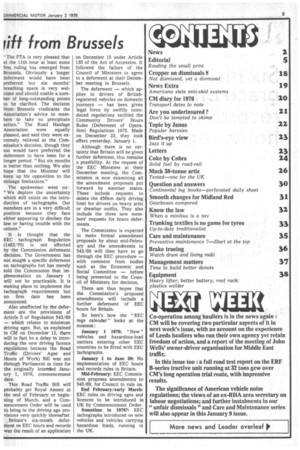11th-hour New Yea
Page 4

Page 5

If you've noticed an error in this article please click here to report it so we can fix it.
COMMON MARKET driving hours and records regulations will not apply in Britain until July 1 at the earliest. That is the immediate result of a sixmonth deferment granted by the EEC Commission and announced by Environment Secretary Anthony Crosland on Tuesday of last week.
A further deferment may poss:bly be granted—the Commission is studying the whole hours issue at the Council of Ministers' request — but at least until July 1 this year drivers of trucks, buses and coaches in Britain can continue to work to the UK rules.
The Department of the Er vironrnent confirmed last wee that all the current hours an records provisions made uncle Part VI of the 1968 Trans pot Act and subsequent amen( ments would continue to appI during the six-month defermer period. Thus all the currer exemptions and concession will apply, and operators Ina use either the EECor style records book.
"Delighted" was th Freight Transport Association' immediate comment on the clE ferment. A spokesman said The FTA is very pleased that at the 11th hour at least some 5rm ruling has emerged from Brussels. Obviously a longer deferment would have been preferred but six months' breathing space is very welcome and should enable a num ber of long-outstanding points to be clarified. The decision from Brussels vindicates the Association's 'advice to mem bers to take no precipitate action." The Road Haulage Association were equally pleased, and said they were extremely relieved at the Com mission's decision, though they too would have preferred the deferment to have been for a longer period. "But six months is better than nothing. We also hope that the Minister will keep up his opposition to the mileage limitations."
The spokesmen went on: " We deplore the uncertainty which still exists on the intro duction of tachographs. Our members are in a very difficult position because they face either appearing to disobey the law or having trouble with the unions."
It is thought that the EEC tachograph Regulation (1463/70) is not affected by the Commission deferment decision. The Government has not sought a specific deferment on tachographs but has merely told the Commission that im plementation on January 1 will not be practicable. It is making plans to implement the tachograph requirements but no firm date 'has been announced.
Also unaffected by the deferment are the provisions of Article 5 of Regulation 543/69 which relates to minimum driving ages. But, as explained in CM on December 12, there will in fact be a delay in introducing the new driving licence regulations because the Road Traffic (Drivers' Ages and Hours of Work) Bill was not through Parliament in time for the originally intended January 1, 1976, commencement date.
This Road Traffic Bill will probably get Royal Assent at the end of February or begin ning of March, and a Commencement Order will be used to bring in the driving age provisions very quickly thereafter.
Britain's six-month deferment on EEC hours and records• was the result of an application on December 15 under Article 135 of the Act of Accession. It followed the failure of the Council of Ministers to agree to a deferment at their December meeting in Brussels.
The deferment — which applies to drivers of Britishregistered vehicles on domestic journeys — has been given legal force by swiftly introduced regulations entitled the Community Drivers' Hours Rules (Deferment of Operation) Regulations 1975. Made on December 23, they took effect yesterday, January 1.
Although there is no certainty that Britain will be given further deferment, this remains a possibility. At the request of the EEC Ministers at their December meeting, the Commission is now examining all the amendment proposals put forward by member states. These include requests to delete the 450km daily driving limit for drivers on heavy artic or drawbar outfits. They also include the three new members' requests for hours deferments.
The Commission is expected to make formal amendment proposals by about mid-February and the amendments to 543/69 will then have to go through the EEC procedure — with comment from bodies such as the Economic and Social Committee — before being presented to the Comcil of Ministers for decision.
There are thus hopes that the Commission's proposed 'amendments will include a further deferment of EEC hours for Britain.
So here's how the "EEC regs calendar" looks at the moment: January 1 1976: " New " vehicles and hazardous-load carriers entering other EEC countries to be fitted with EEC tachographs.
January 1 to June 30: No implementation of EEC hours and records rules in Britain.
Mid-February: EEC Commission proposes amendments to 543/69, for Council to rule on.
End February/early March: EEC rules on driving ages and licences to be introduced in UK by Commencement Order.
Sometime in 1976?: EEC tachographs introduced on new vehicles and vehicles carrying hazardous loads, running in the UK.




































































